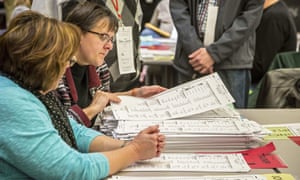Jill Stein: US election recount is vital to reform our broken voting system
Rebecca Solnit, who has written passionately about the recount, interviews Stein about getting an accurate count and ending systematic violation of voting rights

Jill Stein: ‘This is really not only about this election, this is about reforms that need to be made to create an election system that we can believe in.’ Photograph: D. Ross Cameron/AP
Rebecca Solnit
The election didn’t end on 8 November. It just morphed into a crisis whose resolution is not in sight. Hillary Clinton’s campaign was impacted by an October surprise delivered by a partisan FBI, but November was not short on surprises, and there may yet be one in December. A little more than a week ago, while people were wondering what it would take to get the Clinton campaign to pursue a recount, Jill Stein’s campaign amazed everyone by taking on the job. Exuberance for the idea immediately inspired small donors to contribute $6.5m in about 48 hours.
Stein launched the recounts in Wisconsin, Michigan and Pennsylvania at the behest of election experts John Bonifaz and J Alex Halderman, who said the irregularities they saw merited further investigation. Those errors include discrepancies in Donald Trump’s favor between the usually reliable exit polls and the votes in several swing states, beyond what some experts consider the margin of error and other anomalies. One they noted was that in Wisconsin, Clinton received 7% fewer votes in counties with electronic voting machines than in counties that have paper ballots. In Michigan, more than 80,000 ballots were said to be blank where the votes for president would be marked, twice the number left blank in the previous election, and several times the margin between the two candidates.
There were also numerous reports of foreign intervention into state voting systems and other forms of election interference, including the news that Obama called Putin on the “nuclear phone” to tell Russia to stop meddling. This astonishing news item has had no apparent follow-up, beyond Senator Lindsey Graham demanding an investigation and the seven Democratic members of the Senate intelligence committee urging the White House to release its classified information on the subject. Which is to say, we don’t know what happened in our election, and in a democracy we really should.
All this serves as a reminder that the United States’ voting system is an incoherent patchwork of systems of varying degrees of reliability, many with easily hackable machines, all managed by local election officials of varying levels of probity and competence on computers with no notable security. In Pennsylvania, the gap between Clinton’s and Trump’s votes narrowed dramatically even before the recount, as officials got around to actually counting all the ballots (according to Decision Desk HQ, on the day after the election Trump was reported to be ahead in Pennsylvania 126,091 votes, but that lead had narrowed to 44,321 this week, after officials actually counted a lot of the ballots). In Michigan, the difference between the two candidates is a little more than 10,000 votes; in Wisconsin, around 20,000.
There are grounds to wonder whether Trump won those swing states and whether the results are trustworthy. If the recount reveals he didn’t – well, the biggest upset in American political history could be around the corner. People assert it’s unlikely, but things we call unlikely happen routinely, which we forget, because after the Berlin Wall falls or some planes crash into a couple of skyscrapers, it all looks perfectly likely in hindsight.
On Tuesday I talked to Stein, who declined to speculate on the outcome of the process, saying: “We are still so fully engaged right now in the fight to defend the recount and to defend the constitutional right to vote and to have our votes counted. That has occupied, I would say, 200% of our time and our energy so that we have not yet begun to ask such critical questions.”
She remarked that the Trump campaign and Republican state officials’ furious reaction to the recount is “not reassuring that the Trump campaign has confidence in the outcome of the election”. The recount has plowed through numerous obstacles. Last Thursday, Trump’s lawyers challenged the recount in Michigan, but their appeal was denied on Friday. On Wednesday the judge effectively ended the recount, tying his decision to a state court ruling that found Stein had no legal standing to request another look at ballots. Some participants in the recount in Detroit are reporting that representatives of the Trump campaign are intimidating and interfering with the volunteers and paid ballot counters.
Stein’s recount can try to determine the intent of those who actually voted, but there is no way to compensate now for those who were prevented from voting altogether. She said: “We are seeing again this evidence in Michigan that communities of color are systematically disenfranchised through the machinery that constitutes really another form of electoral Jim Crow. I don’t know if you saw the article in [the] Detroit News. It’s pretty staggering. Eighty-seven optical scanners [in Detroit] broke on election day.”
The state has a law preventing recounting votes where there are discrepancies between the machines and the hand-tabulated ballots, which is exactly what you get in a poor city with old voting machinery.
“It’s shocking, absolutely shocking, that Michigan has a law precluding a recount exactly where you would need it. Where the discrepancy exists, you are forbidden from recounting. So we have a battle shaping up right now between the state’s politicized effort to disrespect and discount the vote of the African American community against the federal court which is standing up for the constitutional right to a vote.”
She continued, “What is happening in Detroit, which is enabled by state law, is a systematic violation of basic constitutional voting rights. This is really the underlying question about this voting machine technology, which is that it’s extremely prone to fail in poor communities and communities of color. The US Civil Rights Commission showed that the odds of your vote being miscounted or discounted increases 900% in communities of color. They were referring to the so-called “spoiled vote”. A spoiled vote is where you have filled out your paper ballot and you put it into a counting machine, an optical scanner, and those scanners are highly prone to malfunction if they aren’t properly calibrated. So poor communities that don’t have adequate maintenance and programming and where the machines are not up to date: this is exactly where your ballot is spoiled and it gets essentially tossed aside.”
This is one of the sad realities of the recount. It can perhaps render a more accurate count of votes that were cast, but it cannot bring in those who were excluded in the first place. Stein says: “The value of this recount is not only to get clarity on what the real results of this election are and to have an election we can believe in. Because right now we don’t – as Donald Trump himself is saying. He’s saying that the votes were rigged as well. But the point here is not to help one candidate and hurt another ... I should add, I would have filed for a recount in the Democratic primary since several of those elections were also screaming for scrutiny, but you can’t create a recount unless you have standing in that election. So this is a bipartisan issue. Let’s be very clear about this: Green votes are very much at risk here as well. If there is vote suppression going against a Democratic candidate, you can be sure there is vote suppression going on here against a third-party candidate.
Evidently there is no love lost between Stein and the Clinton’s team. “When the Clinton team weighed in, which was, shall we say, minimalist and a day late,” it was, she said with “about as passive an expression of interest as one could imagine.”
But she reiterates: “This is really not only about this election, this is about reforms that need to be made to create an election system that we can believe in. That means not only getting rid of these error-prone, hack-prone voting machines, that is the touch screens, the DREs [direct-recording electronic machines], we need to get rid of them, as many states have done. Other states are in the process. They need to be banned once and for all in all states.”
I asked Stein about the electoral college the day after one Republican elector announced that he could not and would not vote for Trump, as projects such as the Hamilton Electors were at work trying to sway the votes of enough electors to deny Trump the presidency. They argued that the electoral college was created as a safety check to prevent unqualified candidates from taking office should the popular vote have selected them. She replied: “The electoral college is also on the agenda here. It should be eliminated, and we should have a direct national popular vote. That, as you know, is a very steep hill to climb because it requires a constitutional amendment. There is some discussion, which merits closer exploration, that there is a constitutional basis for assigning the electoral college votes proportional to the popular vote in that state. That might be a plan B that could achieve what sounds like the same thing as the direct national popular vote. In my view, the point is not to help one candidate and hurt another. The point is to create a process that has integrity.”
There has been much written of the large funds Stein has raised throughout this process – and what will happen to what is left unspent. Stein’s view is that: “It’s really quite outrageous and unjust and a symptom of a democracy run amok here, where in order to have transparency and certainty about our votes we voters have to go out and hold bake sales on steroids to raise millions of dollars.” But to her detractors who have questioned what happens to unspent funds she argues: “I can tell you there’s unfortunately about zero chance that we’re going to have excess funds.”
Whether the recount changes the outcome in three states, it calls attention to the ways that the count was already off. As federal Judge Mark Goldsmith has stated, “the right to vote, and to have that vote conducted fairly and counted accurately – is the bedrock of our nation.” Except that what we were told was bedrock has maybe long been quicksand.

Geen opmerkingen:
Een reactie posten
Opmerking: Alleen leden van deze blog kunnen een reactie posten.